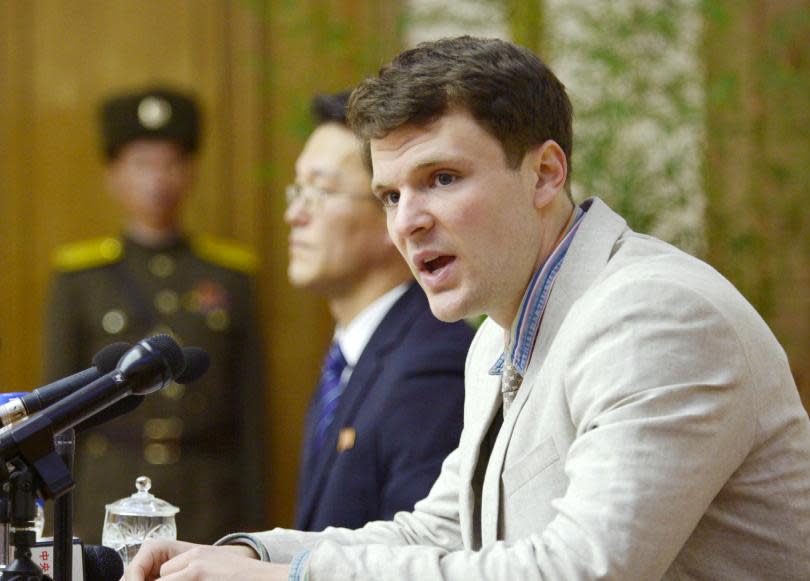Otto Warmbier's Family Doesn't Want Autopsy Performed
The family of former North Korean prisoner Otto Warmbier decided they did not want an autopsy performed after his death. Warmbier died Monday after 17 months of imprisonment in North Korea, but the circumstances surrounding his death remained murky.
The Hamilton County Coroner’s Office in Ohio said Tuesday that Warmbier’s family had decided to forgo an autopsy and instead opted for only an external examination. It remained unclear why the family decided not to have the autopsy.
Read: Otto Warmbier’s Roommate In North Korea Describes The Day Of His Arrest
“No conclusions about the cause and manner of Mr. Warmbier’s death have been drawn at this time,” the medical examiner’s office said, according to NBC News. “There are additional medical records and imaging to review and people to interview.”

Otto Warmbier is transported from a medical airplane to an ambulence at Lunken Airport in Cinncinnati, Ohio, Jun. 12, 2017. Photo: Reuters
Warmbier, an American student, was sentenced to 15 years hard labor in North Korea in January 2016 after being accused of stealing a propaganda poster. The 22-year-old was returned to the U.S. last week in a condition described by doctors as “unresponsive wakefulness.” North Korean officials said Warmbier had contracted botulism and was given a sleeping pill and fell into a coma last April from which he never awoke. Upon his return to the United States, however, doctors said they found no evidence of botulism.
“He showed no signs of understanding language, responding to verbal commands or awareness of his surroundings,” Dr. Daniel Kanter, director of the neurocritical care unit at the University of Cincinnati Medical Center, said in a news conference last week.
Doctors noted that his brain injuries were severe, citing an MRI scan showing extensive tissue damage. The medical team also said it had been too long for Wambier to be considered to be in a coma and that he was apparently in stable condition with no signs of infection when he first arrived back in the U.S. doctors also said he had no broken bones or other signs of physical abuse.
“The study showed extensive loss of brain tissue in all regions of the brain,” said Kanter. “Pattern of this brain injury is usually seen as a result of cardiopulmonary arrest resulting in the death of brain tissue.”
Kanter noted that after his arrival at the hospital, Warmbier had not exhibited any “purposeful movement or behavior” and had not spoken. Warmbier died Monday at the hospital—and doctors said his death may have stemmed from the long flight home.
“If you are in a persistent, vegetative state and you are just immobile for a prolonged period of time, you have a propensity to form a clot. That can be catastrophic and precipitous,” Dr. Daniel Laskowitz, a professor of neurology at Duke University told NBC Tuesday, noting that the flight back from North Korea could have made a blood clot form or spread to the lungs.
“There is no excuse for any civilized nation to have kept his condition secret and denied him top-notch medical care for so long,” Warmbier’s father, Fred Warmbier, told reporters Thursday. His family condemned the “torturous mistreatment” Warmbier received in North Korea.
Read: How Are Prisoners Treated In North Korea?
“Unfortunately, the awful, torturous mistreatment our son received at the hands of North Koreans ensured that no other outcome was possible beyond the sad one we experienced today,” the family said in a statement Monday. “When Otto returned to Cinncinnati late on June 13th, he was unable to speak, unable to see and unable to react to verbal commands. He looked very uncomfortable – almost anguished. Although we would never hear his voice again, within a day the countenance of his face changed – he was at peace.”

Otto Warmbier attends a news conference in Pyongyang, North Korea, Feb. 29, 2016. Photo: Reuters
Related Articles


